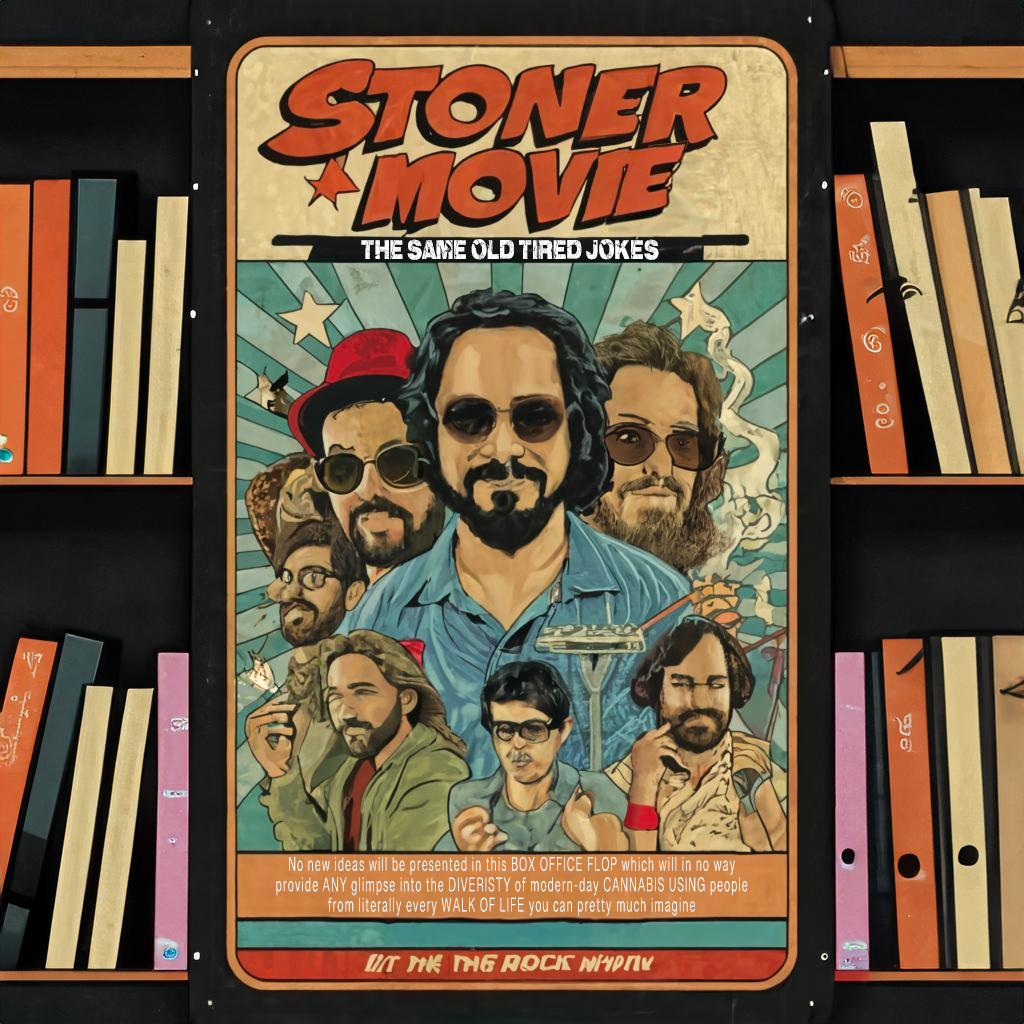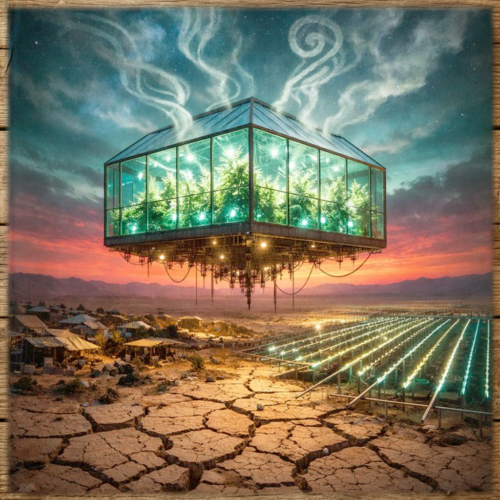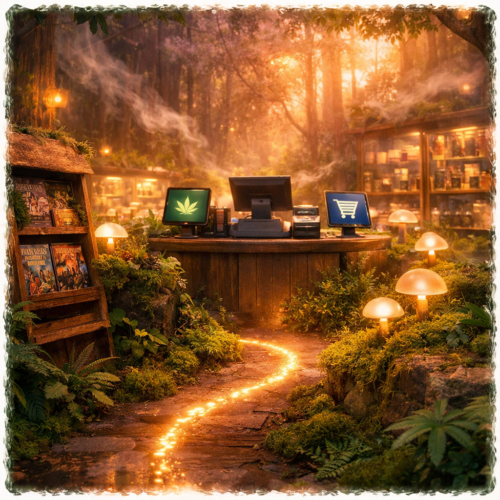Reviewing the Emerald Screen throughout the evolution of cannabis in TV and Film.
The portrayal of cannabis in TV and in film has been a creative goldmine, offering a medley of laugh-inducing comedies and eye-opening social commentary. Despite this rich history, there’s been a recent slump in both the volume and the quality of such narratives. Of course, that’s not to suggest that the entire genre is a hopeless, barren wasteland.
Pot heads who enjoy quality television content, for instance, can easily conjure to mind a list of the recent favorites. Together we all watched the farewell episodes of beloved stoner shows, which, despite their departure, continue to captivate and entertain. Indeed, those shows still shine through as programs geared toward normalizing cannabis use by illustrating to mainstream media viewers what many already know, that pot is not as scary as “they” once said was, and a vast diversity of people, from all walks of life, comprise its users.
Weeds (SHOWTIME ’05-12) is a TV series that follows Nancy Botwin, a widowed mother who sells marijuana to support her family in Agrestic, California. The series explores her life, relationships, and illegal activities with other characters and drug dealers. The show was created by Jenji Kohan and starred Mary-Louise Parker, who won a Golden Globe for her performance. The show ran for eight seasons and was praised for its dark comedy, social satire, and strong female characters.
Broad City (Comedy Central ’14-19) is created by and stars Ilana Glazer and Abbi Jacobson, two best friends who navigate everyday life in New York City. The series, like the web series it was based on, is inspired by Glazer and Jacobson’s real-life friendship and their attempt to “make it” in New York. The show features cannabis as a recurring element in the characters’ adventures, often leading to hilarious and absurd situations. The show was produced by Amy Poehler and has been ranked among the best comedy shows of the 2010s.
High Maintenance (HBO ’16-20) is a TV series that follows the lives of unique New Yorkers who use cannabis as a common thread. The series explores their personal struggles, relationships and challenges through the eyes of their weed deliveryman, played by Ben Sinclair. The show is based on a web series of the same name, created by Sinclair and Katja Blichfeld, and has received critical acclaim for its realistic, diverse and humorous portrayal of cannabis culture.
Just as is the case with cannabis in tv, in the realm of cinema, there has historically been no shortage of decent options when it comes to cannabis-related content.
Half-Baked (1998) is a stoner comedy film starring Dave Chappelle, Jim Breuer, Harland Williams, and Guillermo Díaz. The co-written by Chappelle and Neal Brennan, his friend and frequent collaborator. The film tells the story of four friends who start selling marijuana to bail out their friend who accidentally killed a police horse. The film features many cameos from famous comedians and celebrities, such as Jon Stewart, Snoop Dogg, Willie Nelson, and Bob Saget. The film received negative reviews from critics but has since become a cult classic among cannabis enthusiasts and comedy fans.
Cheech and Chong’s Up in Smoke (1978) is the first feature-length film of the legendary comedy duo Cheech Marin and Tommy Chong. The film tells the story of two stoners who unknowingly smuggle a van made entirely of marijuana from Mexico to Los Angeles, while being chased by a zealous narcotics officer. The film is filled with hilarious scenes and dialogues, as well as many cameos from famous comedians and celebrities. The film is considered a cult classic and a pioneer of the stoner comedy genre, as well as a satire of the war on drugs.
Dazed and Confused (1993) is a coming-of-age comedy film written and directed by Richard Linklater. The film follows a group of teenagers on the last day of school in 1976, as they celebrate, party, and get high. The film features a large ensemble cast of actors who would later become stars, such as Matthew McConaughey, Ben Affleck, Milla Jovovich, and Parker Posey. The film is praised for its realistic, diverse, and humorous portrayal of the 70s youth culture, as well as its nostalgic soundtrack of classic rock songs.
To be clear, these classics are not going anywhere. They’ve stood the test of time and have continued to reach subsequent generations of cannabis newcomers to this day. However, in recent years, as the smoke settles and the high fades from some of the more memorable and brilliant cannabis-related offerings, a number of creatives have tried, and sadly failed, to adequately represent cannabis in tv and film.
Authenticity Dilemma:
Cannabis, often trapped in a web of stereotypes and media misrepresentations, had found genuine moments of positive representation. However, the current wave of cannabis-themed content seems to have lost touch with the real-life, modern cannabis user. The result is a predictable mix of boring recycled stoner jokes and about as much verisimilitude as this family photographer’s masterpiece.
Consider Netflix’s “Disjointed,” a series that theoretically had every ingredient for an iconic portrayal of cannabis in TV: a stellar cast and an ideal premise. Yet, it faltered, leaning heavily on outdated clichés rather than pioneering new ground.
“Disjointed” (2017-18) aimed to ride the wave of marijuana’s growing popularity and legalization but unfortunately fell flat. The show struggled to find a balance between comedy and drama, resulting in a bland, uninspiring watch. “Disjointed” featured Kathy Bates as Ruth, a dispensary owner in Los Angeles. Despite the potential for a groundbreaking sitcom, the show fumbled with stale jokes and superficial characters. Its humor missed the mark, with a thin plot and a setting that felt disconnected from the cannabis culture it aimed to represent.
Moreover, the show’s attempt to delve into serious topics like PTSD lacked the necessary sensitivity and depth; what could have been an excellent opportunity to inform ended up being a punchline accompanied by a laugh-track. As one critic put it, the show was “a half-baked mess that never lives up to its premise or its cast.”
Diving deeper into the Netflix stash, “Cooked with Cannabis” (2020) floats up as yet another case of great potential, yet it doesn’t quite hit the high notes. The premise is entertaining enough: a culinary battleground where three chefs whip up cannabis-infused delights, all eyeing a tasty $10,000 prize. At the helm are singer Kelis and chef Leather Storrs, critiquing alongside their “best buds,” a rotation of guest judges.
But here’s the rub: the show just doesn’t gel with the everyday cannabis aficionado. It paints a picture of cannabis cuisine that’s more high-society than high-times, missing the buzz and depth needed to truly sizzle.
Moreover, the show sidesteps a golden opportunity to school its audience on the real deal about cannabis: its benefits, its potential, and the historical blunders like prohibition and the war on drugs. Imagine a show, for instance, that brings cannabis cooking into the kitchens of regular folks, with a host who’s relatable to the average Jane or Joe of the cannabis world.
Generally speaking, there’s an apparent void begging to be filled at present, with a a show that can breathe fresh life into concepts involving cannabis in TV and cinema. Nevertheless, recycled jokes and shallow depictions of cannabis users continue to inform the masses of the supposed “ills” of the plant and its use.
Surely, there is still a lot of work to be done to improve the representation of cannabis and its users in media, and to ensure that it is fair, accurate, and inclusive. Media representation is not only a reflection of reality, but also a source of influence and power. It can shape how people perceive themselves and others, how they relate to the world, and how they act and react. Therefore, it is crucial that media representation of cannabis and its users is not only entertaining, but also enlightening and empowering.
It should not only celebrate the joys and benefits of cannabis, but also acknowledge the challenges and struggles that cannabis users face. It should not only showcase the diversity and creativity of the cannabis community, but also address the issues and inequalities that affect it. It should not only inform and educate the audience about the nuances and socio-economic impacts of cannabis policy, but also inspire and mobilize them to take action and make a difference.
The Future of Cannabis Content
There’s vast potential for a modern cannabis comedy to redefine the genre. Imagine a series that balances humor, intelligence, and an insightful portrayal of the varied cannabis community. While the ideal representation might still be in the making, the direction is hopeful. With the growing tide of legalization and the emergence of new, diverse voices in the creative sphere, we’re on the cusp of a resurgence in cannabis-themed content that appeals to a wide and diverse audience.
For the moment, we treasure the classics and remain optimistic about the future of cannabis-centric entertainment. To be sure, the narrative of cannabis in tv and film is still being written, and the path ahead holds renewed hope for content that genuinely reflects the dynamic and diverse world of cannabis enthusiasts. Keep your eyes open and your bowls ready for the next wave of groundbreaking cannabis narratives.
Extending the Conversation
As we traverse this subject matter, it’s essential to consider the role of cannabis in broader cultural contexts. The plant’s journey from a misunderstood, often vilified substance to a celebrated and legal commodity is a story rich with social, political, and cultural implications. Understanding this journey can provide valuable insights into how cannabis is portrayed in media and, perhaps more importantly, how it’s perceived in society at large.
The cannabis narrative in media is not just about entertainment; it’s a reflection of our evolving attitudes towards this complex and multifaceted plant. It is the hope of many cannaseurs that the conversation around cannabis continues to grow and evolve, and, that as it does, so too will the stories we see on our screens. The future of cannabis in TV and film is not just about creating content that appeals to the lowest common denominator, which as of yet still consists of outdated views; it’s about crafting narratives that are inclusive, insightful, and reflective of the diverse experiences and perspectives within the cannabis community.

***
Trap Culture is the ultimate destination for cannabis enthusiasts who want to experience the best of Arizona’s cannabis culture. Whether you are looking for the hottest cannabis-friendly events, the latest news about everything from cannabis in TV and film to trends in the cannabis industry, or the most exclusive and limited-edition products from the top brands in the market, Trap Culture has you covered. Visit our website to learn more about our events, our blog, and our store. Follow us on social media to stay updated on the latest news and promotions. Join the Trap Culture family and experience the most immersive and engaging cannabis-friendly social events in Arizona.


